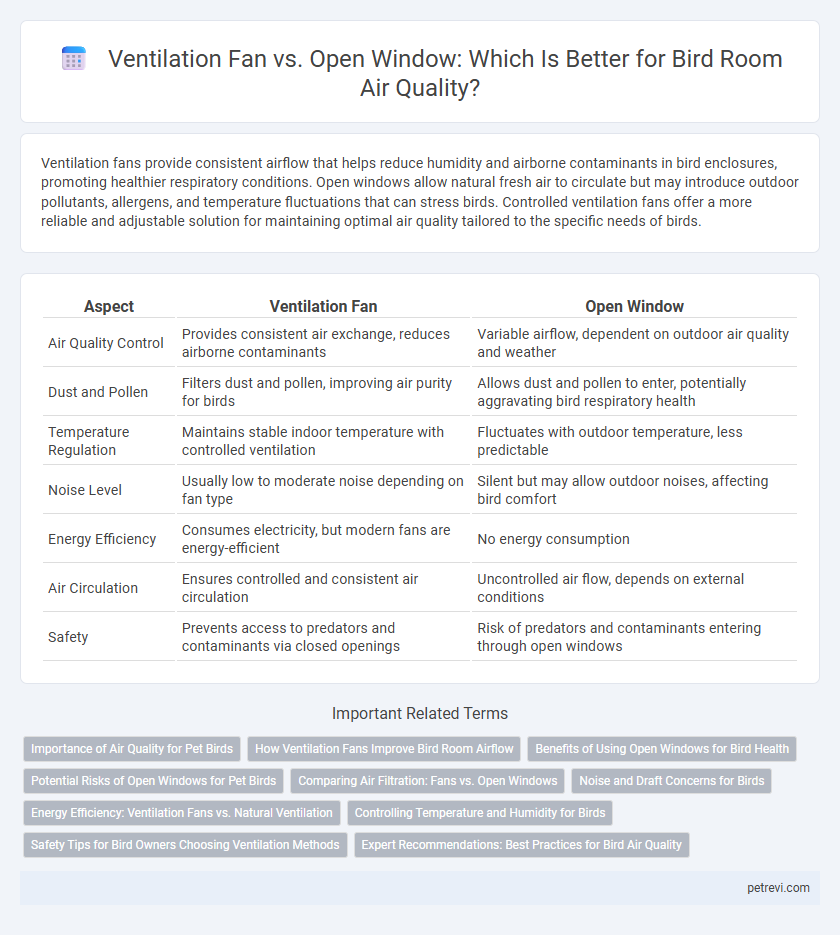Ventilation fans provide consistent airflow that helps reduce humidity and airborne contaminants in bird enclosures, promoting healthier respiratory conditions. Open windows allow natural fresh air to circulate but may introduce outdoor pollutants, allergens, and temperature fluctuations that can stress birds. Controlled ventilation fans offer a more reliable and adjustable solution for maintaining optimal air quality tailored to the specific needs of birds.
Table of Comparison
| Aspect | Ventilation Fan | Open Window |
|---|---|---|
| Air Quality Control | Provides consistent air exchange, reduces airborne contaminants | Variable airflow, dependent on outdoor air quality and weather |
| Dust and Pollen | Filters dust and pollen, improving air purity for birds | Allows dust and pollen to enter, potentially aggravating bird respiratory health |
| Temperature Regulation | Maintains stable indoor temperature with controlled ventilation | Fluctuates with outdoor temperature, less predictable |
| Noise Level | Usually low to moderate noise depending on fan type | Silent but may allow outdoor noises, affecting bird comfort |
| Energy Efficiency | Consumes electricity, but modern fans are energy-efficient | No energy consumption |
| Air Circulation | Ensures controlled and consistent air circulation | Uncontrolled air flow, depends on external conditions |
| Safety | Prevents access to predators and contaminants via closed openings | Risk of predators and contaminants entering through open windows |
Importance of Air Quality for Pet Birds
Maintaining optimal air quality is crucial for pet birds, as poor ventilation can lead to respiratory issues and stress. Ventilation fans effectively regulate airflow and filter out airborne contaminants, reducing the risk of mold, dust, and harmful fumes in the bird's environment. While open windows provide fresh air, they may introduce pollutants, allergens, and temperature fluctuations that can negatively impact sensitive avian respiratory systems.
How Ventilation Fans Improve Bird Room Airflow
Ventilation fans enhance bird room airflow by continuously circulating fresh air, reducing humidity and eliminating harmful airborne contaminants such as ammonia and dust. These fans create a controlled environment that minimizes drafts and stabilizes temperature, crucial for maintaining bird respiratory health. Unlike open windows, ventilation fans prevent outdoor pollutants and allergens from entering while ensuring consistent air exchange, improving overall air quality for birds.
Benefits of Using Open Windows for Bird Health
Open windows provide natural airflow that effectively reduces indoor air pollutants and humidity, creating a fresher environment for birds. Exposure to outdoor air through open windows enhances oxygen levels and helps prevent respiratory issues common in enclosed spaces. The consistent circulation and exchange of air foster a healthier habitat, promoting overall bird well-being and vitality.
Potential Risks of Open Windows for Pet Birds
Open windows can expose pet birds to harmful airborne pollutants, drafts, and sudden temperature changes, increasing the risk of respiratory issues and stress. Ventilation fans provide controlled airflow that helps maintain consistent air quality without exposing birds to outdoor contaminants or unpredictable weather conditions. Ensuring stable indoor air quality with a ventilation fan reduces the potential health risks associated with open windows for sensitive avian respiratory systems.
Comparing Air Filtration: Fans vs. Open Windows
Ventilation fans equipped with HEPA or activated carbon filters efficiently remove airborne pollutants and allergens, providing consistent air quality control in bird enclosures. Open windows allow natural airflow but can introduce outdoor pollutants, dust, and allergens, making air quality less predictable. For optimal bird respiratory health, filtered ventilation fans offer superior air filtration compared to relying solely on open windows.
Noise and Draft Concerns for Birds
Ventilation fans provide controlled airflow that improves bird air quality by reducing humidity and toxins without creating strong drafts, which can distress birds. Open windows allow natural ventilation but often introduce inconsistent drafts and external noise that may cause stress and disrupt the birds' environment. Selecting a low-noise ventilation fan over open windows minimizes auditory disturbance and maintains stable air circulation, promoting better respiratory health for birds.
Energy Efficiency: Ventilation Fans vs. Natural Ventilation
Ventilation fans provide controlled airflow and consistent air exchange, improving bird air quality with lower energy consumption compared to heating or cooling losses from open windows. Natural ventilation through open windows relies on external weather conditions, often causing temperature fluctuations that increase energy use in indoor environments. Installing energy-efficient ventilation fans optimizes air quality while minimizing energy costs in bird habitats.
Controlling Temperature and Humidity for Birds
Ventilation fans provide consistent air exchange that effectively controls temperature and humidity levels in bird enclosures, reducing the risk of respiratory issues and overheating. Open windows offer natural airflow but can cause fluctuations in temperature and humidity, potentially stressing birds and affecting their health. Maintaining stable environmental conditions with a ventilation fan ensures optimal air quality, promoting bird well-being and comfort.
Safety Tips for Bird Owners Choosing Ventilation Methods
Ventilation fans help circulate air effectively while filtering out harmful particles, reducing airborne toxins that threaten bird respiratory health. Open windows provide natural airflow but risk exposing birds to outdoor pollutants, drafts, and sudden temperature changes that can stress their delicate respiratory systems. Bird owners should ensure ventilation fans are placed to avoid direct airflow on birds and maintain window screens to prevent escapes while monitoring indoor air quality consistently.
Expert Recommendations: Best Practices for Bird Air Quality
Expert recommendations emphasize using ventilation fans with HEPA filters to improve bird air quality by effectively reducing airborne particles, dander, and ammonia. Open windows can provide fresh air but may introduce outdoor pollutants and allergens, risking bird respiratory health. Maintaining consistent airflow and humidity control through ventilation systems is favored for optimal indoor air quality in bird habitats.
Ventilation Fan vs Open Window for Bird Air Quality Infographic

 petrevi.com
petrevi.com